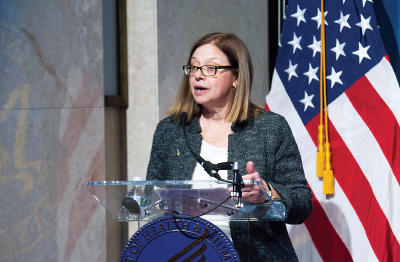Psychiatrist Elinor McCance-Katz, M.D., Ph.D., brings to the highest levels of federal decision making a new focus on serious mental illness and substance use disorders. She will deliver the 2018 William C. Menninger Memorial Convocation Lecture at the Convocation of Fellows and Distinguished Fellows at APA’s 2018 Annual Meeting in May.
McCance-Katz is the assistant secretary of mental health and substance use in the Department of Health and Human Services—a new position created by the 21st Century Cures Act, signed into law by then President Barack Obama in 2016—and head of the Substance Abuse and Mental Health Services Administration (SAMHSA). In her lecture, she will share the federal policymaking perspective of a clinician who has spent her career on the front lines of patient treatment. She will also describe changes under way at SAMHSA to support people with serious mental illness and to address the nation’s opioid crisis.
“I have been involved in patient care since I left my residency 30 years ago,” McCance-Katz told Psychiatric News. “I hope to bring a perspective on how policymaking affects individuals and practitioners. I believe Congress wanted to create a position that would not only provide leadership but would also work closely with other parts of the federal government that have a role in addressing specific needs of patients and families—the departments of Labor, Housing and Urban Development, and Education, among others.
“I believe Congress also wanted a position in the federal government that would be engaged in ongoing outreach to stakeholders to better understand what is happening in American communities and help adjust what the federal government is doing to a changing landscape,” she said.
McCance-Katz said that she has two overriding priorities in her new position. “One is to address issues related to serious and persistent mental illness and focus the work of SAMHSA on really meeting the needs of those living with these disorders,” she said.
She noted that as part of the 21st Century Cures Act, Congress also created an “Interdepartmental Serious Mental Illness Coordinating Committee” overseen by SAMHSA. “This is a partnership that allows stakeholders in mental health to review current programs within the federal government that address the needs of those with serious mental illness and to identify the needs that are not being addressed. This is going to be a very valuable resource.”
Not surprisingly, her other major focus is the opioid crisis, especially expanding the cadre of providers trained in evidence-based treatment of addiction. “It’s not enough to throw a lot of money at this problem,” she said. “We need to have an intense focus on expanding the workforce as it relates to the treatment of substance use disorders generally and opioid addiction specifically.”
It’s a multifaceted problem. “I don’t think we are going to solve the problem quickly,” she said. “It took a long time to get here, and it will take several years to get under control.” A wild card, she said, is the recent introduction of fentanyl and carfentanyl, opioid analogs that have dramatically increased the lethality of drugs sold on the street.
But McCance-Katz sees progress being made. Prior to coming to SAMHSA, she was appointed by Rhode Island Gov. Gina Raimondo to the Governor’s Overdose Prevention and Intervention Task Force. The task force developed an action plan that included, among other features, placement of peers in hospital emergency departments to help overdose victims find treatment; distribution of naloxone and training of first responders in how to use the agent; regulations on the amount of prescription pain killers that could be prescribed for acute pain; and the creation of 10 “Centers of Excellence” around the state for treatment of opioid addiction.
For the first nine months of 2017, the task force reported an 8 percent drop in overdose deaths. According to the task force’s website, between January and September 2017, there were 233 deaths due to overdose in the state, compared with 253 during the same period in 2016.
“You have to work on all fronts—there are many moving parts to this problem,” McCance-Katz said. “These are promising results. If we can do it in Rhode Island, we can do in communities around the country.”
The synergism between the opioid epidemic and the history of past overprescription of opioid painkillers for acute pain is a complicated one. “I want to make clear to my colleagues and to the public that I don’t think it makes sense to use the information we have today about the addictive nature of opioid painkillers to make judgments about the past,” she said. “The vast majority of physicians prescribing opioids did so with the intention of relieving pain.”
Beginning in the 1990s, pain was increasingly recognized as a “vital sign,” and its treatment became a priority of patients. Pharmaceutical companies began marketing opioid painkillers; last year the pharmaceutical manufacturer of Oxycontin (Purdue) pled guilty to misbranding of the agent and misleading regulators, physicians, and patients about the potential for addiction and risk for abuse.
“Going forward, we have better information about how to treat pain, and we know that there are alternatives to prescribing opioids,” McCance-Katz said. “At the same time, we have to be quite careful—there are people who need these medications.”
Her message to psychiatrists? “We need your input,” she said. “I would ask my colleagues in psychiatry who are not practicing in the area of substance use disorders to consider doing so. And I would ask those who have these skills to share them with others. We desperately need the input and expertise that psychiatrists have to train allied health professionals and expand our workforce.” ■
The Convocation of Fellows and Distinguished Fellows will be held Monday, May 7, from 5:30 p.m. to 6:30 p.m. in the Javits Center.■

